
If you find yourself often sliding into a comparison-with-others and green-with-envy bubble, this post is for you…
Minimalism. Hygge. KonMari method. How do those terms instantly make you feel?
Do they conjure feelings of deprivation, guilt, sacrifice and empty promises?
Or are you already a devout follower and minimalism is therapy, representing serenity, simplicity and a stance against consumerism?
The rise of the minimalist movement in the 2010s has largely focused on the decluttered visual aesthetic. In actual fact the term originates from a 1960s New York art movement that was not particularly mainstream at all. In the momentum of the terms popularity, like many trends before it, the real sentiments behind the minimalist way of living have been lost. In many ways it has even become a how-to guide book with slogans such as “Own less stuff. Find more purpose.” A vague blanket solution for happiness.
Does all this sound too familiar? Have you previously and hastily tossed possessions only to find the ‘goal’ of minimalism is unachievable?
Intentionality
Collectively we all need to discard the projected air of moral superiority associated with minimalism and rather replace the mindset with intentionality. Because at its core, minimalism is being intentional with the way you live your life. Prioritising (not eliminating) what aligns with your most important values to take up the majority of your space and your time.
Values are personal and unique, so everyone’s version of minimalist living should look very different. So please forget the image of all-white stark walls. Minimalism is not homogenising, rather accentuating and celebrating individual quirkiness. But what is similar, is consistency.
Consistency in the application of these values bringing alignment of physical space, mind space and people space. And it is this alignment that is the endgame to more time, more peace and more freedom.
Minimalism is not about depriving yourself of the things you love. That is exactly the opposite of what it really is. The whole point of minimalism is to remove all the excess so you can truly value, see and use the things you love. Placing emphasis on the experience of discovering the items we choose to bring into our lives is as important as owning those items.
So why not embrace minimalism with intentionality?
Questions to ask yourself…
Perhaps start by challenging yourself with these thoughts…
• What do you own and why do you own it
• Who do you spend your time with and why
• What do you spend your finances on
• Assess your current workplace and future career goals
• What is your digital and social media footprint
• What are your passions and spirituality
Just remember don’t be afraid to showcase these intentions. You might even be surprised what you discover you actually value.
Comments